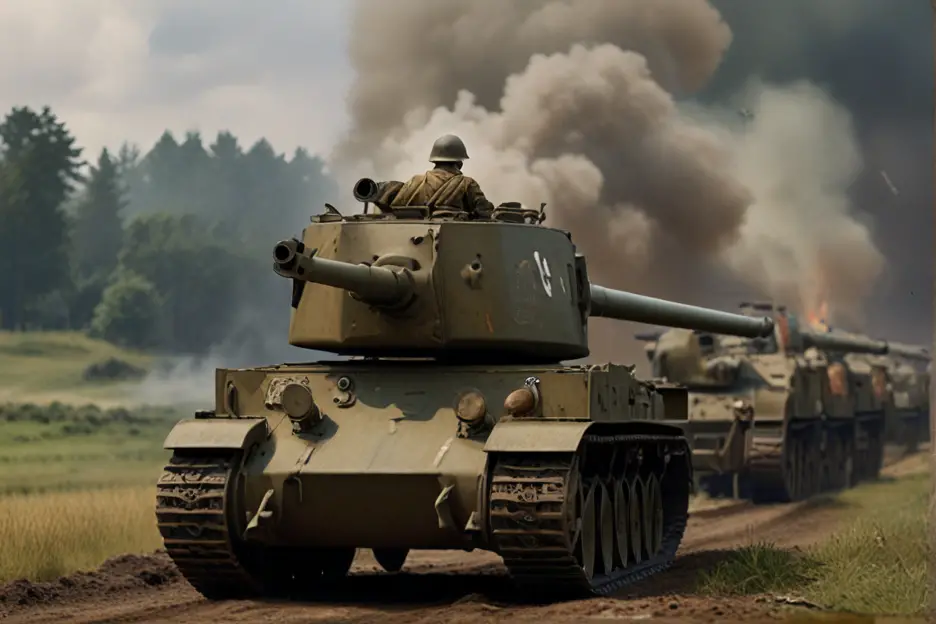
World War II was one of the most significant events in human history, and it was marked by numerous major battles that shaped the course of the war.
In this blog post, we’ll explore some of the most influential battles of World War II, their effects, and their significance.
Specific Major Battles of World War II
Battle of Britain (1940)
The Battle of Britain, fought from July to October 1940, was a landmark event in World War II.
It marked a significant setback for the German air force, as the Royal Air Force (RAF) successfully defended the United Kingdom against German air raids.
This victory prevented a potential invasion of the UK by German forces and lifted the spirits of the British people, boosting morale during a critical time in the war.
- Read also: Understanding the Differences: World War I Vs World War II
- Read also: A Battlefield Guide: Exploring the Major Battles of World War I
Battle of Stalingrad (1942-1943)
The Battle of Stalingrad, which raged from August 1942 to February 1943, it stands out as one of the deadliest conflicts in history.
With an estimated 1 million casualties, this battle was a turning point in the war.
The Soviet Union’s staunch defense halted the German advance and eventually led to their retreat.
The Battle of Stalingrad profoundly affected the morale of the Soviet people and played a crucial role in the ultimate defeat of Nazi Germany.
D-Day (1944)
D-Day, also known as the Normandy landings, which occurred on June 6, 1944.
This monumental operation marked the largest seaborne invasion in history.
Allied forces landed in Normandy, France, and waged a fierce battle until August 1944.
The outcome was the liberation of Western Europe from Nazi control.
D-Day was a pivotal moment, allowing the Allies to establish a foothold in Europe and set the stage for the eventual downfall of Nazi Germany.

Battle of Midway (1942)
The Battle of Midway, fought in June 1942, stands as a pivotal naval engagement between the United States and Japan during World War II.
This battle is widely regarded as a turning point in the Pacific War.
Key to the American victory was the interception and deciphering of Japanese communications, enabling the US Navy to anticipate the Japanese attack and launch a successful counteroffensive.
The Battle of Midway dealt a significant blow to the Japanese Navy and marked the beginning of US naval dominance in the Pacific theater, shifting the momentum of the war in favor of the Allies.
Battle of Iwo Jima (1945)
The Battle of Iwo Jima, which took place between February and March 1945, it was a fiercely contested battle between US and Japanese forces for control of the strategically important island of Iwo Jima.
The battle resulted in one of the bloodiest conflicts of the Pacific War, with over 26,000 casualties on the American side alone.
Despite the high cost, US Marines ultimately succeeded in capturing the island.
The significance of the Battle of Iwo Jima lies not only in its strategic importance but also in its profound impact on the morale of US forces and its contribution to the eventual defeat of Japan in the war.

Effects of Those Battles
The major battles of World War II left lasting impacts that rippled through the course of the conflict and shaped its ultimate outcome.
Here’s a closer look at the effects of these pivotal battles:
Boosted morale
Each victory, whether on land, at sea, or in the air, provided a crucial morale boost for the Allied forces.
These victories instilled confidence and determination, reinforcing the belief that victory was achievable despite the formidable challenges posed by the Axis powers.
Halted enemy advances
Many of these battles served as critical turning points by halting the relentless advances of enemy forces.
Whether it was the successful defense of Britain during the Battle of Britain or the staunch resistance at Stalingrad, these battles forced the Axis powers to reassess their strategies and gave the Allies crucial breathing room to regroup and counterattack.
Contributed to axis defeat
The cumulative effects of these battles played a significant role in the eventual defeat of the Axis powers.
Each victory weakened the enemy’s military capabilities, drained their resources, and eroded their morale.
The relentless pressure exerted by the Allied forces across multiple theaters of war ultimately proved insurmountable for the Axis.
Influenced military strategy
The lessons learned from these battles have had a lasting impact on military strategy and tactics.
From the innovative use of intelligence and code-breaking in the Battle of Midway to the strategic planning and coordination of the Normandy landings, these battles have served as valuable case studies for military planners and historians alike.
The tactics and innovations developed during World War II continue to inform military doctrine and operations in subsequent conflicts.

- Read also: What would happen if World War 3 broke out?
- Read also: What Was the Shortest War in History? A Short Facts About War
Conclusion
The major battles of World War II played a crucial role in shaping the course of the war and its outcome.
From the Battle of Britain to the Battle of Iwo Jima, these battles had significant impacts on the morale of the forces involved and the eventual defeat of the Axis powers.


